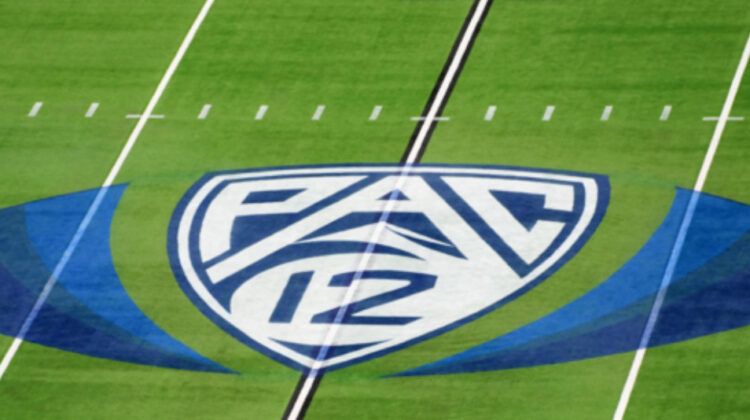Executives from Washington and Oregon acknowledged in writing that they would be excluded from decisions related to the future of the Pac-12 — a potentially critical piece of evidence as Washington State and Oregon State, the only remaining schools, wage a legal battle for control of the conference.
The letters were written by Washington president Ana Mari Cauce and Oregon vice president Kevin S. Reed to Pac-12 commissioner George Kliavkoff. They are dated Aug. 4, the day the Huskies and Ducks agreed to join the Big Ten, and were obtained by the Hotline this week from Whitman County (Wash.) Superior Court.
Except for the first six words, the letters are identical. (Cauce’s version is below.) They begin by explaining that the Pacific Northwest powers would not sign “a grant of media rights authorization” — the move that sent five other schools fleeing to other leagues and triggered the Pac-12’s collapse.
The letters then state that Washington and Oregon expected “to remain an active and participating member in the Conference until” next summer. But both Cauce and Reed, who doubles as Oregon’s general counsel, seemingly acknowledged that they were relinquishing their board authority on long-term strategic matters:
“I understand that the University will be excluded from Conference discussions pertaining to matters occurring after August 1, 2024, such as media rights agreements and new Conference member considerations.”
With 10 schools set to depart for other leagues, the Pac-12 is scrambling to gain clarity on a series of interconnected issues, including what constitutes “notice of withdrawal” from the conference, control of assets and the extent of authority possessed by Washington State and Oregon State at the exclusion of the 10 outbound universities.
The Cougars and Beavers, who fear they could be outvoted 10-2 on issues vital to their future, secured a temporary restraining order on Monday that prevents the Pac-12 from conducting board meetings until the makeup of the all-powerful body is determined.
While it seems simple enough for the outbound members to participate in discussions about issues impacting the conference during the 2023-24 sports season but not matters affecting the future, there’s a hitch: The present and future are inseparable from a monetary standpoint as WSU and OSU consider whether to rebuild the conference.
“Every dollar spent now is one dollar less that would be available to Washington State and Oregon State,” a source said.
The letters were included as exhibits in Kliavkoff’s declaration to Whitman County court, where WSU and OSU began legal proceedings on Sept. 8.
The central question: What constitutes delivery of notice of withdrawal from the conference, which triggers immediate removal from the board of directors?
Cauce and Reed took care in their Aug. 4 letters to state: “For the sake of clarity, the University is not delivering a notice of withdrawal from the Conference at this time in contravention of Chapter 2, Section 3 of the Conference bylaws.”
But the Cougars and Beavers believe the 10 outgoing schools delivered notice with their public announcements of plans to join other leagues. One day after Cauce stated her letter was not a notice of withdrawal, she held a news conference with reporters to discuss the move to the Big Ten.
“This was heart-wrenching,” she said of the decision to leave Washington’s longtime home.
And one month later, Kliavkoff sent a letter to WSU president Kirk Schulz and OSU president Jayathi Murthy — it’s marked as Exhibit 15 in his court declaration — in which he disputed the notion that the 10 outbound schools have relinquished their board positions:
“Your suggestion that ten of the Conference’s 12 members have ‘withdrawn’ from the Conference within the meaning of the Bylaws is mistaken. Not one member school has signaled any intention — or actually attempted — to leave Conference play at any time prior to the end of the current fiscal year on July 31, 2024, or to take back and exploit their media rights.
“We simply cannot accept the suggestion that only two members. — Oregon State University (OSU) and Washington State University (WSU) — now have the right to determine by themselves all issues affecting the Conference, and determine the course of all revenue coming into the Conference, to the exclusion of the other ten member schools.”
However, Kliavkoff’s position seems to contradict the Pac-12’s official stance, which was initially established 14 months ago following USC and UCLA announcing that they would join the Big Ten.
On July 14, 2022, then-Pac-12 general counsel Maggy Carlyle wrote to UCLA attorney Bobby Swerdlow that the conference expected UCLA representatives to serve on committees focused on student-athlete well being “and other matters that do not create an inherent conflict of interest.”
But Carlyle’s letter continued:
“On the other hand, it is clear that UCLA’s participation in certain meetings and committees will create a material conflict of interest and it will therefore be inappropriate for UCLA to participate. For instance, the Pac-12 recently publicly announced that we would be exploring membership expansion options and that we would immediately begin negotiations for our next media rights agreements.
“The July 1st and 5th Board meetings alluded to in your letter addressed those specific issues. It would have been a direct conflict and contrary to the best interests of the Pac-12 membership as a whole, to allow UCLA to participate in these discussions or have a vote on such topics, as information discussed and votes which occurred at such meetings was directly related to competing with the Big Ten, and could be used by UCLA, the Big Ten or any third party affiliated with the Big Ten, to the Pac-12’s detriment.”
That same day, July 14, Carlyle wrote an identical letter to USC’s senior vice president and general counsel, Beong-Soo Kim.
The schools’ attorneys took issue with the notion that they had delivered notice of withdrawal. But neither UCLA chancellor Gene Block or USC president Carol Folt participated in Pac-12 board meetings from that point forward.
Colorado became the third school to depart, on July 27, 2023, as chancellor Phil DiStefano sent Kliavkoff the following text message, according to court documents:
“Our Board will vote this afternoon at 3:00 to join the Big 12 Conference. It was not an easy decision and I realize its impact on the other members. If there is a time you are available today, I am happy to call you. Phil.”
DiStefano was subsequently removed from the Pac-12 board, per a letter from Pac-12 general counsel Scott Petersmeyer to Colorado’s senior counsel, Katie Gleeson:
“Under Section CB 2-3 of the Pac-12’s Constitution and Bylaws, Chancellor DiStefano and CU’s representation on the Pac-12’s Board of Directors automatically ceases effective immediately, and CU no longer has the right to vote on any matter before the Board.”
Now, just two schools remain. The Cougars and Beavers are mulling whether to rebuild the Pac-12 — a decision that hinges, to a large extent, on the assets available in the Pac-12. The board controls the assets, but which schools control the board? All 12, or just the remaining two?
WSU and OSU believe it’s the latter.
“The meaning of the bylaws hasn’t changed just because more members have decided to leave,” Eric MacMichael, attorney for the plaintiffs, told the court on Monday.
A preliminary injunction hearing has not been scheduled.
Letter from Washington president Ana Mari Cauce to Pac-12 commissioner George Kliavkoff on Aug. 4:
Dear George,
The University of Washington will not be delivering a grant of media rights authorization to the Conference for any time beyond August 1, 2024. For the sake of clarity, the University is not delivering a notice of withdrawal from the Conference at this time in contravention of Chapter 2, Section 3 of the Conference bylaws. The University shall comply with all obligations, and expects to continue receiving the benefits, related to being a member of the Conference through August 1, 2024. While the University expects to remain an active and participating member in the Conference until that time, I understand that the University will be excluded from Conference discussions pertaining to matters occurring after August 1, 2024, such as media rights agreements and new Conference member considerations.
Related posts:

(AP Photo/Ralph Freso, File)
Mailbag: Pac-12 presidential tumult (and what it means), imagining the ADs in charge, current TV dollars, the survival line and more Pac-12 chaos: Judge sides with WSU and OSU, brings board business to temporary halt
Pac-12 chaos: Judge sides with WSU and OSU, brings board business to temporary halt  Pac-12 football preview: Our picks for the conference race, with projected records, analysis and a title game projection
Pac-12 football preview: Our picks for the conference race, with projected records, analysis and a title game projection  Pac-12 bowl projections: The CFP challenge, Utah repeats, USC gets squeezed and eight teams qualify
Pac-12 bowl projections: The CFP challenge, Utah repeats, USC gets squeezed and eight teams qualify

